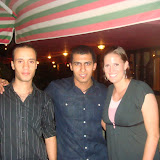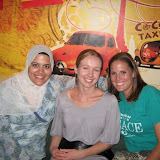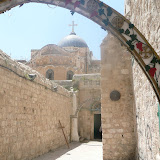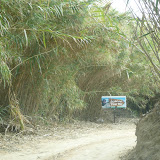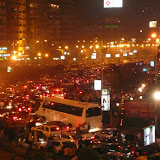
Thought that this was interesting....and also very true!! I know its not politically correct to copy and paste the article, but blogspot wasn't a share option:(
June 20, 2008
Cairo Journal
With a Word, Egyptians Leave It All to Fate
By MICHAEL SLACKMAN
CAIRO — The McDonald’s here has golden arches, the same golden arches as anywhere else in the world. The food is prepared the same assembly-line way, too. But there is an invisible, or more precisely, divine, element in bringing that burger to the plate that the uninitiated may not be prepared for.
“Inshallah,” or “God willing,” the counterman said as he walked off to see about a burger without onions at the McDonald’s on the Alexandria Desert Road, 30 miles from the center of Cairo.
Egyptians have always been religious, from Pharaonic times to the present. Any guidebook to Egypt alerts tourists to Egyptians’ frequent use of inshallah in discussing future events, a signal of their deep faith and belief that all events occur, or don’t occur, at God’s will. “See you tomorrow,” is almost always followed by a smile and, “inshallah.”
But there has been inshallah creep, to the extreme. It is now attached to the answer for any question, past, present and future. What’s your name, for example, might be answered, “Muhammad, inshallah.”
“I say to them, ‘You are already Muhammad or you are going to be Muhammad?’ ” said Attiat el-Abnoudy, a documentary filmmaker in Cairo.
Inshallah has become the linguistic equivalent of the head scarf on women and the prayer bump, the spot where worshipers press their foreheads into the ground during prayers, on men. It has become a public display of piety and fashion, a symbol of faith and the times. Inshallah has become a reflex, a bit of a linguistic tic that has attached itself to nearly every moment, every question, like the word “like” in English. But it is a powerful reference, intended or not.
Political and social commentators here say its frequent use reflects or fuels, or both, the increasing degree to which people have dressed the routine of daily life up with religious accessories. Will the taxi get me to my destination? Will my sandwich come without onions? What’s my name? It’s always, “God willing.”
“Now inshallah is used in a much broader way than 20 years ago,” said the Egyptian playwright Aly Salem. “We always used to say inshallah in relation to plans we were going to do in the future. Now it is part of the appearance of piety.”
The starting point for inshallah is faith, but just like the increasing popularity of the head scarf and the prayer bump, its new off-the-rack status reflects the rising tide of religion around the region. Observance, if not necessarily piety, is on the rise, as Islam becomes for many the cornerstone of identity. That has put the symbols of Islam at the center of culture, and routine.
“Over the past three decades, the role of religion has been expanded in everything in our lives,”’ said Ghada Shahbendar, a political activist who studied linguistics at American University in Cairo.
Deference to the divine has become a communal reflex, a compulsive habit, like the incessant honking of Egyptian cabdrivers — even when there are no other cars on the street.
Samer Fathi, 40, has a small kiosk that sells chips and cigarettes and phone cards downtown. He was asked for a 100-unit phone card and responded almost absent-mindedly “inshallah,” as he flipped through the stack to find one.
At 19 Ismael Street the elevator door opened.
“Going down?”
“Inshallah,” a passenger replied.
As it has become routine, inshallah has also become a kind of convenience, a useful dodge, a bit of theological bobbing-and-weaving to avoid commitment. No need to say no. If it doesn’t happen, well, God didn’t mean it to happen. Nazly Shahbendar, Ghada’s daughter, said for example if she was invited to a party she did not want to attend, she would never say no.
“I’d say inshallah,” said Ms. Shahbendar who is 24 and anything but a picture of the new religiosity. She is not veiled or shy about talking to men; she smokes in front of her mother.
She also points out that inshallah is not the only religious term to infiltrate the lexicon of routine. The younger Ms. Shahbendar, like many people here, have taken to using the Shahada, the Muslim declaration of belief, as a routine greeting. So instead of “How are you? Fine, and you?” she will say to a friend “There is no God but God,” to which the friend will complete the statement. “And Muhammad is his prophet.”
People now answer the phone that way, too, skipping hello altogether. It would be something like Christians greeting each other with “Christ is risen!” followed by “Christ will come again.” Not just on Sundays, but every day.
“We are a very religious people, Egyptians,” said Mostafa Said, 25, as he told his friend he hoped, inshallah, to have his car turn indicator fixed by next week. “We believe God is responsible for what happens, even to the car.”
But it is not just about faith in the celestial that has people invoking God. It is also, at least for some, a lack of faith in the earthbound rulers who run the place. People here are tired — of the rising prices and the eroding wages, of the traffic, of the corruption, of the sense that it is every man for himself.
“In this place, when something works, or you want something to work, you thank God, because it’s certainly not the government who is going to help you,” said Sherif Issa, 48, a taxi driver in Cairo with a nicotine-stained mustache and a fair size belly. “It’s because everything is going in the wrong direction — who can we look up to except God?”
That Mr. Issa is a Christian is evidence that the use of inshallah is not just a phenomenon of Egypt’s Muslims.
“It doesn’t matter whether you’re a Christian or a Muslim,” he said. “I’m going to take you to your house, arriving there in a decent amount of time is already a miracle. Of course I say inshallah!”
Nadim Audi contributed reporting.



